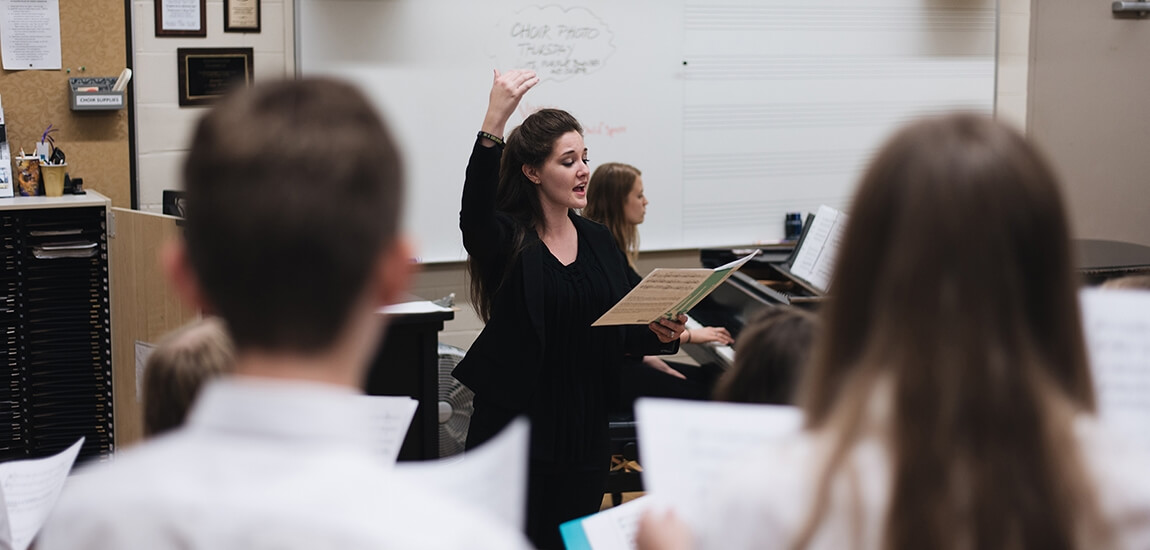Learn to teach vocal or instrumental music to children in grades K–12 in public or private school settings.
Auditions
Entrance auditions are required for this major. Auditions are during the spring semester. You must be admitted to both Northwestern and the Department of Music & Theatre to major in music. Please refer to the Music Admissions & Scholarships for audition requirements and dates.
Music education may be the right degree for you if you
- enjoy vocal or instrumental music
- are eager to serve
- are passionate about teaching
- are interested in a career in education
Why study music education at Northwestern?
You’ll learn the subject matter and how to create a supportive learning environment for students of all backgrounds. Our faculty believe in equipping you with the expertise and cultural competence needed to stand out from your peers.
This program normally takes 4.5 years to complete, which includes a semester of student teaching. You will select one of the following specializations for your major:
- Vocal and Classroom Music Specialization with emphasis: vocal
- Vocal and Classroom Music Specialization with emphasis: vocal with primary instrument piano
- Instrumental and Classroom Music Specialization with emphasis: instrumental
- Instrumental and Classroom Music Specialization with emphasis: instrumental with primary instrument piano
Northwestern’s Department of Teacher Educaiton provides four levels of classroom practicum experience:
- The first level allows you to find your personal “fit” within the teaching profession.
- The second focuses on developing theory and skills related to diversity.
- The third engages you to apply methodologies within your chosen field by creating, teaching, and evaluating lessons in a school classroom.
- The final level is full-time student teaching in a chosen licensure field.
The Department of Teacher Education provides teacher education programs approved by the MN Professional Educator Licensing and Standards Board and as a result, meet the state standards adopted for licensure programs as defined in state rule 8710.2000 through 8710.8080. All licensure programs are aligned with INTASC (Interstate Teacher Assessment and Support Consortium) standards and the Minnesota Standards of Effective Practice.
The University of Northwestern – St. Paul is an accredited institutional member of the National Association of Schools of Music (NASM) since 1986.
Request Information
Careers in music education
There are a variety of career and academic pathways that begin with a degree in music education.
What types of work are related to this degree?
- Teaching in your area of specialty
- Private tutoring
- Creating/directing educational programs
- Curriculum development
- Instructional design (technology training may be required)
- Textbook editing
- Online education
- Corporate or business training and development
- Private instructor
- Music librarian
- Administrative positions in music/fine arts
What will I learn?
You will learn to analyze sheet music and be able to teach music to children in grades K-12.
MUS 2176
Fundamentals of Conducting
Technique, practices and principles of conducting, including hand and baton technique, metric patterns, tempo, style, dynamics, terminology study and preparation of the score. Practical experience with performing organizations is stressed.
MUH 3106
Music in World Cultures
An introductory study of cultural traditions, belief systems and practices of world cultures as approached through the study and analysis of the music of ethnic groups. Various worldviews are examined through comparison with biblical and theological concepts.
MTC 1007
Music Theory Foundations
A study of the foundational concepts of music: pitch, rhythm, scales, modes, intervals, chords, and harmony with an introduction to notation software, piano, and singing.

Still have questions about this program or how to apply?
Our team is ready with answers!
Discover the School of Education & Behavioral Sciences
Professors at Northwestern are focused on their students first. Our faculty include experts in their respective fields who want to help you grow in your faith while you earn your degree.


